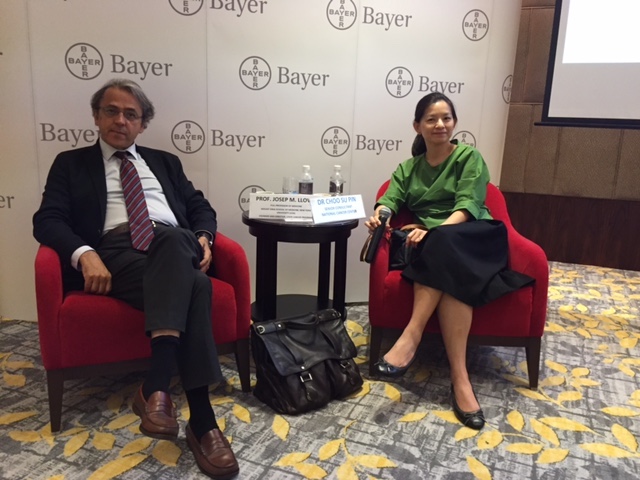Managing liver cancer
Liver cancer is the third most fatal cancer in Singapore, affecting 24 in every 100,000 people per year. The most common, HCC, is both difficult to detect with little to no symptoms.
In Singapore, liver cancer is the third most fatal cancer, affecting 24 in every 100,000 people each year. Worldwide, it is the second leading cancer-related death with approximately 850,000 new cases per year. Mortality due to liver cancer has increased in the past 20 years and the latest estimates indicate that the global health burden of this disease will continue to grow.
Prof Josep Llovet, professor of research, BCLC Group, Liver Unit of IDIBAPS-Hospital Clinic of Barcelona, founder and director of the Liver Cancer Program, full professor of medicine at Mount Sinai School of Medicine, New York University, and director, Master in Translational Medicine at the Faculty of Medicine, University of Barcelona, who was in town recently at a Bayer press conference to share more about liver cancer, said that in 2020, there will be a million new cases per year.
Most common
Among all the primary liver cancers, hepatocellular carcinoma (HCC) is the most common, representing 90 percent of all cases. Statistics show that the main risk factors for developing HCC in the Asia and Africa regions are – hepatitis B and C, and alcohol use, which can potentially lead to liver cirrhosis and this increases the risk of liver cancer. Other risk factors include: Obesity, anabolic steroids and tobacco use. The statistics indicate that more than 75 percent of HCC in the world occurs in the Asia-Pacific region with an annual incidence of HCC at 20 to 100 cases per 100,000 people.
According to statistics in Singapore, there are about 300 new cases per year of HCC. Furthermore, men are three times more likely to develop HCC than women, and it occurs more from 40- to 50-years-old and more common in Chinese males. Dr Choo Su Pin, senior consultant and chief of Gastrointestinal Oncology in the Division of Medical Oncology, National Cancer Centre Singapore, shared that with new cases, there is also a dramatic rise of survival due to better treatment options, for one.
HCC is difficult to detect with little to no symptoms in the early stage of the disease and often, patients are diagnosed during the advanced stage. Dr Choo added: “The majority of patients with liver cancer have no symptoms. Therefore, it is often detected by chance as a result of an ultrasound test or a CT scan for other unrelated problems. In certain patients, there may be vague symptoms of heaviness or discomfort on the right side of the abdomen. Pain and loss of appetite or weight loss are usually late symptoms.” Other symptoms include jaundice, nausea and vomiting, and itchy skin.
Hence, overall survival decreases with the advancing stages of the disease. If left untreated, most HCC patients do not survive beyond six months. The overall five-year survival rate for advanced HCC is less than five percent, further showing that the disease is deadly.
Treatment options
For liver cancer, only 40 percent of patients are diagnosed where potentially curative treatments are possible. These range from operation or resection to liver transplant. For more advanced stages of the disease, transarterial chemoembolisation (for immediate HCC) and multikinase inhibitors+ have shown survival benefits.
For early stage of HCC or BCLC stage A, surgical operation is the treatment option. Stage B refers to the immediate stage of HCC where surgery is not possible. The standard treatment option is transarterial chemoembolisation, however, it is discouraged in patients with advanced liver dysfunction. Stage C is the advanced stage of HCC and systemic therapy with the drug by Bayer called sorafenib (which costs S$4,000 a month for a full dose) is the recommended treatment option. Stage D is the terminal stage of the disease where only the best supportive care or palliative treatment is considered.
Based on the Ministry of Health guidelines, patients with established hepatitis B or C carrier status or with liver cirrhosis would benefit from regular AFP (alpha-fetoprotein) estimations and ultrasound examinations. These tests are usually done at six-monthly intervals depending on the severity of liver damage.
As for prevention, family members of patients with hepatitis B are advised to check their hepatitis B status. If they are not infected and are without protection, it is advisable to go for immunisation against hepatitis B. There is currently no immunisation for hepatitis C. It is also wise to drink in moderation.


0 Comments